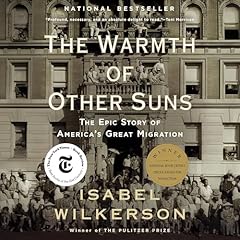
The Black Cabinet
The Untold Story of African Americans and Politics During the Age of Roosevelt
No se pudo agregar al carrito
Solo puedes tener X títulos en el carrito para realizar el pago.
Add to Cart failed.
Por favor prueba de nuevo más tarde
Error al Agregar a Lista de Deseos.
Por favor prueba de nuevo más tarde
Error al eliminar de la lista de deseos.
Por favor prueba de nuevo más tarde
Error al añadir a tu biblioteca
Por favor intenta de nuevo
Error al seguir el podcast
Intenta nuevamente
Error al dejar de seguir el podcast
Intenta nuevamente
 Exclusivo para miembros Prime: ¿Nuevo en Audible? Obtén 2 audiolibros gratis con tu prueba.
Exclusivo para miembros Prime: ¿Nuevo en Audible? Obtén 2 audiolibros gratis con tu prueba.
Elige 1 audiolibro al mes de nuestra inigualable colección.
Acceso ilimitado a nuestro catálogo de más de 150,000 audiolibros y podcasts.
Accede a ofertas y descuentos exclusivos.
Premium Plus se renueva automáticamente por $14.95 al mes después de 30 días. Cancela en cualquier momento.
Compra ahora por $24.75
-
Narrado por:
-
Bahni Turpin
-
De:
-
Jill Watts
Most prominent in the Black Cabinet were Mary McLeod Bethune, an educator close to Eleanor Roosevelt, and her “boys”: Robert Weaver, a Harvard-educated economist who pioneered enforcement standards for federal anti-discrimination guidelines (and, years later, the first African American Cabinet secretary); Bill Hastie, a lawyer who would become a federal appellate judge; Al Smith, head of the largest black jobs program in the New Deal at the WPA; and Robert Vann, a newspaper publisher whose unstinting reporting on the administration’s shortcomings would keep his erstwhile colleagues honest. Ralph Bunche, Walter White of the NAACP, A. Philip Randolph, and others are part of the story as well. But the Black Cabinet was never officially recognized by FDR, and with the demise of the New Deal, it disappeared from history.
Jill Watts’s The Black Cabinet is a dramatic full-scale examination of a forgotten moment that speaks directly to our own.
Los oyentes también disfrutaron:




















Las personas que vieron esto también vieron:



Great Story
Se ha producido un error. Vuelve a intentarlo dentro de unos minutos.
Intriguing book!
Se ha producido un error. Vuelve a intentarlo dentro de unos minutos.
The historical narrative tends to privilege outside agitation of groups like the NAACP and Thurgood Marshall, King and the SCLC, CORE, SNCC, and the Black Panther Party - groups using both institutional and extra- institutional means. Watts complements this narrative - and the social movement analytical lens that perpetuates it - by unveiling the black Americans who struggled thanklessly from inside federal government institutions during the crucial era of the 1930s and 1940s.
Even for those aware of the extent to which New Deal programs increased rather than decreased racial inequality in the United States, Watts' texts unearths the potential that if not for black cabinet members such as Bethune, Weaver, Al Smith, and Hastie, black Americans would have been completely shut out from the New Deal and would be even further behind white American counterparts than they currently are.
Moreover, Watts' thorough research helps to complete or even to correct the images of Franklin and Eleanor Roosevelt, their complicated relationships to black American leadership, and their influence over the quality of black lives. Watts shows that FDR (and even Eleanor Roosevelt to a lesser extent) needed to be pushed, pulled, and prodded to make even the moderate concessions he made toward black America during his years in office. That is, credit for the moderate positive effects of New Deal programming on black lives largely goes to the Black Cabinet rather than to Roosevelt. And Watts' text details this overlooked and perhaps entirely forgotten truth.
In addition to reading this text alongside the Rosenstein and Katznelson texts mentioned above, I recommend this text as a prelude to Katznelson's Fear Itself, Carol Anderson's Eyes Off the Prize, Michael Krenn's Black Diplomacy, Brenda Gayle Plummer's Rising Wind, Penny Von Eschen's Race Against Empire, and Anderson's Bourgeois Radicals - all of which explore black Americans as creators and not merely as subjects or objects of government policy - including American foreign policy - in the years before (and, for some of these texts, during) the Civil Rights and black power movements of the late 1950s through early 1970s.
Pursuing reform from inside government
Se ha producido un error. Vuelve a intentarlo dentro de unos minutos.
Wow! So insightful.
Se ha producido un error. Vuelve a intentarlo dentro de unos minutos.
eye opening
Se ha producido un error. Vuelve a intentarlo dentro de unos minutos.


